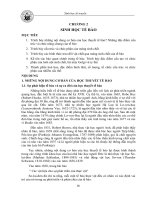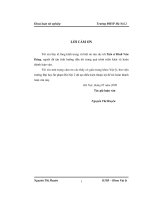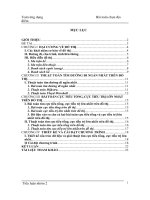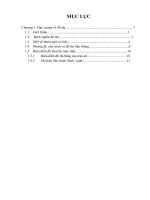Tin học ứng dụng trong công nghệ hóa học Parallelprocessing 2 mpi
Bạn đang xem bản rút gọn của tài liệu. Xem và tải ngay bản đầy đủ của tài liệu tại đây (403.29 KB, 58 trang )
MPI
THOAI NAM
Outline
Communication modes
MPI – Message Passing Interface Standard
TERMs (1)
Blocking
If return from the procedure indicates the user is allowed to reuse
resources specified in the call
Non-blocking
If the procedure may return before the operation completes, and
before the user is allowed to reuse resources specified in the call
Collective
If all processes in a process group need to invoke the procedure
Message envelope
Information used to distinguish messages and selectively receive
them
<source, destination, tag, communicator>
TERMs (2)
Communicator
– The communication context for a communication
operation
– Messages are always received within the context they
were sent
– Messages sent in different contexts do not interfere
– MPI_COMM_WORLD
Process group
– The communicator specifies the set of processes that
share this communication context.
– This process group is ordered and processes are
identified by their rank within this group
MPI
Environment
Point-to-point communication
Collective communication
Derived data type
Group management
MPI
P0
P2
P1
P4
P3
Daemon
Daemon
P0
P1
P2
Daemon
P3
P4
Environment
MPI_INIT
MPI_COMM_SIZE
MPI_COMM_RANK
MPI_FINALIZE
MPI_ABORT
MPI_Init
Usage
– int MPI_Init( int* argc_ptr,
char** argv_ptr[] );
/* in */
/* in */
Description
– Initialize MPI
– All MPI programs must call this routines once
and only once before any other MPI routines
MPI_Finalize
Usage
int MPI_Finalize (void);
Description
– Terminates all MPI processing
– Make sure this routine is the last MPI call.
– All pending communications involving a process
have completed before the process calls
MPI_FINALIZE
MPI_Comm_Size
Usage
int MPI_Comm_size( MPI_Comm comm, /* in */
int* size );
/* out */
Description
– Return the number of processes in the group
associated with a communicator
MPI_Comm_Rank
Usage
– int MPI_Comm_rank ( MPI_Comm comm,/* in */
int* rank ); /* out */
Description
– Returns the rank of the local process in the group
associated with a communicator
– The rank of the process that calls it in the range
from 0 … size - 1
MPI_Abort
Usage
– int MPI_Abort( MPI_Comm comm, /* in */
int errorcode );
/* in */
Description
– Forces all processes of an MPI job to terminate
Simple Program
#include “mpi.h”
int main( int argc, char* argv[] )
{
int rank;
int nproc;
MPI_Init( &argc, &argv );
MPI_Comm_size( MPI_COMM_WORLD, &nproc );
MPI_Comm_rank( MPI_COMM_WORLD, &rank );
/* write codes for you */
MPI_Finalize();
}
Point-to-Point Communication
MPI_SEND
MPI_RECV
MPI_ISEND
MPI_IRECV
MPI_WAIT
MPI_GET_COUNT
Communication Modes in MPI (1)
Standard mode
– It is up to MPI to decide whether outgoing messages
will be buffered
– Non-local operation
– Buffered or synchronous?
Buffered(asynchronous) mode
– A send operation can be started whether or not a
matching receive has been posted
– It may complete before a matching receive is posted
– Local operation
Communication Modes in MPI (2)
Synchronous mode
– A send operation can be started whether or not a
matching receive was posted
– The send will complete successfully only if a matching
receive was posted and the receive operation has
started to receive the message
– The completion of a synchronous send not only
indicates that the send buffer can be reused but also
indicates that the receiver has reached a certain point
in its execution
– Non-local operation
Communication Modes in MPI (3)
Ready mode
– A send operation may be started only if the
matching receive is already posted
– The completion of the send operation does not
depend on the status of a matching receive and
merely indicates the send buffer can be reused
– EAGER_LIMIT of SP system
MPI_Send
Usage
int MPI_Send( void* buf,
int count,
MPI_Datatype datatype, /* in */
int dest,
int tag,
MPI_Comm comm );
/* in */
/* in */
/* in */
/* in */
/* in */
Description
– Performs a blocking standard mode send operation
– The message can be received by either MPI_RECV or
MPI_IRECV
MPI_Recv
Usage
int MPI_Recv( void* buf,
int count,
MPI_Datatype datatype, /* in */
int source,
int tag,
MPI_Comm comm,
MPI_Status* status );
/* out */
/* in */
/* in */
/* in */
/* in */
/* out */
Description
– Performs a blocking receive operation
– The message received must be less than or equal to the length of the
receive buffer
– MPI_RECV can receive a message sent by either MPI_SEND or
MPI_ISEND









